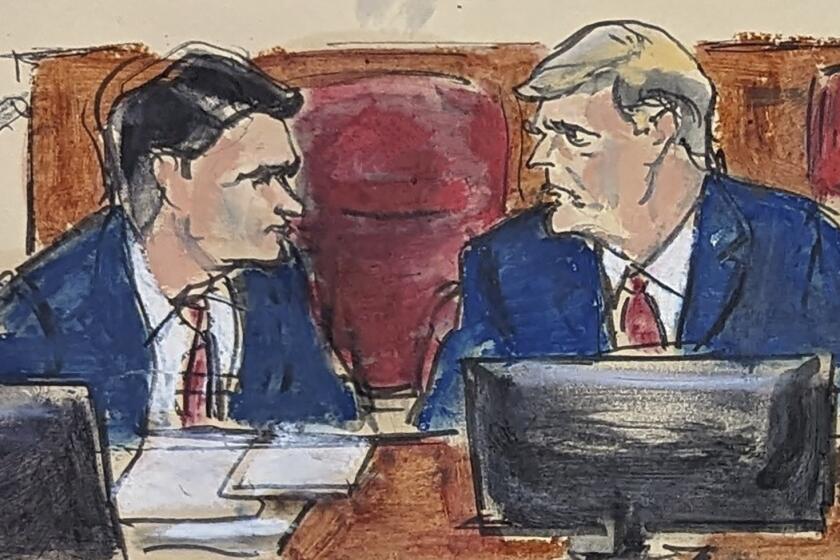Kerry Comes Under Fire for Stance on Iraq
In a speech nine days ago in Missouri, Sen. John F. Kerry laid out his case against President Bush on Iraq, saying the administration had left America dangerously isolated from the rest of the world.
But the presumed Democratic nominee did not mention the brewing international furor over the mistreatment of Iraqi detainees by U.S. soldiers at the Abu Ghraib prison, an issue that seemed ready-made to bolster his critique.
The Massachusetts senator’s initially guarded response to the scandal underscores the delicate balancing act he faces in calibrating his reactions to developments in Iraq.
Though setbacks for the U.S. may strengthen Kerry’s assertion that Bush is mishandling the conflict, any criticism he makes of the military effort threatens to undermine the Democrat’s portrayal of himself as a national security hawk who unflinchingly backs U.S. troops, political experts said. At the same time, some analysts said, Kerry has not made full use of the opportunity to present himself as a viable alternative.
The difficult political terrain led to the candidate’s early reticence in addressing a surge of violence that gripped Iraq last month, and most recently, the graphic images of prisoners being humiliated and tortured by their U.S. guards.
“It’s a tightrope walk for John Kerry,” said Roy Neel, a longtime aide to Al Gore who took the helm of former Vermont Gov. Howard Dean’s presidential bid in its final months. “This has been a problem he’s had to deal with for some time. The danger is that if he’s too strident on the prisoner issue, it could backfire as demagoguery.”
Two days after CBS broadcast photos of U.S. troops abusing Iraqi prisoners, Kerry released a statement saying he was “disturbed and troubled” by the images. But he did not speak out publicly about the abuses for a week.
Since then, as the White House has come under increasing fire for its handling of the crisis and some legislators have called for the resignation of Defense Secretary Donald H. Rumsfeld, Kerry has sharpened his rhetoric.
On Friday, he made his most forceful statement yet about the prisoners’ mistreatment, calling on the president to take full responsibility for the military’s handling of the abuses. Meanwhile, his campaign circulated an e-mail petition to supporters demanding that Rumsfeld resign.
But some analysts said that by responding so slowly, Kerry lost a valuable opportunity to emphasize how he would handle the situation in Iraq.
“If he’s going to win this election, he needs to be articulating a different vision for Iraq,” said Joseph Tuman, who teaches political communication at San Francisco State University.
“This issue is one more example of how he’s not showing how he’s different than Bush.”
But Kerry aides said there was no advantage for the candidate to address the issue before Bush did.
“Why would we want to jump on a story like this and politicize it before the facts were out?” asked spokeswoman Stephanie Cutter. “This is a pretty serious case. We felt that this is something that the administration should answer first.”
Some allies concurred, praising Kerry’s measured response in the early days of the scandal as politically astute.
“The Iraqi question is such a double-edged sword,” said Pennsylvania Gov. Ed Rendell, a former chairman of the Democratic National Committee. “The worse things become, there is a tendency of the American people to want to rally around the commander-in-chief.”
Indeed, Republicans warned that efforts to politically capitalize on the scandal would backfire on the Democratic presidential candidate.
“I don’t see how Kerry could criticize the president on this,” said Charlie Black, a veteran Republican strategist and informal advisor to the Bush-Cheney campaign. “If he did, he’d, in effect, be criticizing the U.S. military, which would be a dangerous position for him to take.”
Throughout the campaign, Kerry has struggled to deliver a clear message about his stance on Iraq. After voting in October 2002 to authorize military action there, he distanced himself from the administration’s handling of the invasion while Dean rode a wave of antiwar sentiment in the months before the Democratic primaries and caucuses.
Meanwhile, Kerry has sought to use his position as a decorated Vietnam veteran to reinforce his national security credentials, only to be confronted by Republicans who have challenged the seriousness of his wounds and his behavior as an antiwar activist after he left the Navy.
In recent weeks, the senator has tried to simultaneously emphasize his support for the troops and distinguish his approach on Iraq from that of the administration.
His calls for recruiting more countries to join the military and reconstruction efforts were undercut by Bush’s recent endorsement of a United Nations presence in Iraq. But now, with the images of prisoner abuse fueling global antagonism toward America, some analysts said the scandal added potency to Kerry’s argument that he could make the U.S. safer by working more closely with allies.
“The foreign policy message that Kerry has is, ‘I will restore America’s credibility in the world,’ ” said Ivo Daalder, who served as a National Security Council aide in the Clinton administration. “This episode just underscores how little credibility we have left.”
Republicans disputed the political effect of the scandal, contending that many GOP voters would not be concerned about antagonizing America’s allies.
“That’s a nice argument for the quiche crowd,” said Republican pollster Dick Dresner.
Michael Genovese, a political science professor at Loyola Marymount University and the author of 14 books on the presidency, said Kerry’s cautious responses to the recent insurgency and the prisoner abuses had only further blurred his position for voters.
“He’s always a step behind,” Genovese said. “He seems very cautious. Rather than try to take advantage of opportunities, he seems to not want to make mistakes.”
Earlier last week, Kerry did not call on Bush to apologize for the incidents until after he was repeatedly pressed on the matter.
“Let me just assure you that if I were president, we’d have a very different set of activities going on in Iraq today,” Kerry told reporters during a stop in Northeast Los Angeles on Wednesday.
“But would you apologize?” he was asked.
“I’d want to get the facts and hold the people accountable and make the appropriate statements.... I said we ought to take appropriate responsibility,” Kerry said. “If that means apologizing for the behavior of the soldiers when that [fact-finding] happens, then I think we ought to do that.”
The next day Bush issued an apology.
*
Times staff writer Maria L. La Ganga contributed to this report.
More to Read
Get the L.A. Times Politics newsletter
Deeply reported insights into legislation, politics and policy from Sacramento, Washington and beyond. In your inbox three times per week.
You may occasionally receive promotional content from the Los Angeles Times.







